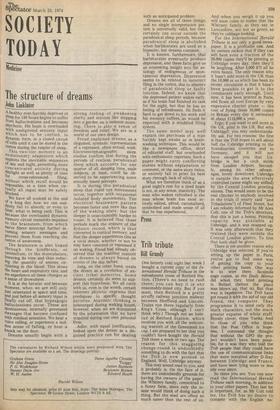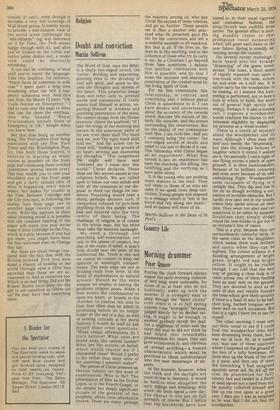Press
Trib tribute
Bill Grundy
One bitterly cold night last week I bought a current copy of the International Herald Tribune in the refreshment room of Retford Station. (There's no need to rush there; you can buy it in any reasonably-sized city. But if you must, then Retford is a pretty scruffy railway junction midway between Sheffield and Lincoln. Trains run there regularly from King's Cross, although I can't think why.) Though not an habitué of Retford Station, which receives you with all the welcoming warmth of the Greenland ice cap, I am prepared to bet that you couldn't have bought the Herald Trib there a week or two ago. The reason for this staggering change-round is undoubtedly something to do with the fact that the Trib is now printed in England. Well, Uxbridge anyway.
This may sound mad to you, and it probably is. On the face of it, there are undoubtedly grounds for having the owners of the paper, the Whitney family, committed to a funny farm, since only the insane would think of doing such a thing. But the mad are often so much saner than the rest of us. And when you weigh it up you will soon come to realise that the Whitney family, as they say in Lancashire, are not as green as they're cabbage-looking.
For the International Herald Tribune is not only a good newspaper. It is a profitable one. And its owners reckon that if they can sell here even a fraction of the 50,000 copies they'll be printing at Uxbridge every day, then they'll
be laughing. After 3,000 it'll all be extra bunce. The only reason why it hasn't sold more in the UK than the 10,000 or so which has been its recent circulation is that it hasn't been possible to get it to the commuters early enough. Until now, it has been printed in Paris, and flown all over Europe by very expensive charter plane — the cost of flying those 10,000 copies to Britain every day is estimated at about E110,000 a year.
Ergo; if you want to sell more in the UK, print in the UK. But why Uxbridge?, you may understanda
bly ask. For two reasons: the first is that the Trib hopes to sell about
half the Uxbridge printing to the Scandinavian countries and to Germany, and it will not have escaped you that Ux bridge is but a cock stride from London Airport. Second ly, among its other advant ages, lovely downtown Uxbridge is outside the area effectively controlled (some might say stifled) by the Central London printing unions. This would seem to be the real clincher to anybody involved in the trials (I nearly said "and Tribulations") of Fleet Street, but I am reliably informed by Mr Alex
Colt, one of the nib's directors, that this is just a bonus. Printing
capacity was available at Uxbridge, and it was snapped up. It was only afterwards that they realised they were outside the Central London ghetto. To him that hath shall be given.
There is yet another reason why Uxbridge was selected. If you're setting up the paper in Paris, you've got to find some way of getting the copy to your other printing bases. One way
is to wire them facsimile page copies, as the Daily Mirror
did when they tried printing in Belfast (before the place was blown up, that is). But that
way is expensive. The Trib have
got round it with the aid of our old friend, the computer. They programme it to send only the black characters, not the much greater expanse of white stuff. Bloody clever, these Yanks. And to those of you who think that the Post Office is hope less, I commend the thought that without the GPO the project wouldn't have been possi ble, for it was they who told the
Trib people that they could have the use of communications links
that were installed after D-Day between Uxbridge and France, and have been lying more or less idle ever since.
So there you are. You can now read the International Herald Tribune each morning, in addition to your other papers. That last bit is important, for, as Mr Colt told me, the Trib has no desire to compete with the English na tionals. It can't, even though it includes a very full coverage of Wall Street prices. It merely wants to provide a mid-Atlantic view of the world scene .(although the "mid-Atlantic" tag was bestowed on it by Time, the Trib seems happy enough with it), and after you've looked at the trivia our native press dishes out, a wider view could be distinctly refreshing.
It can also be confusing, at least until you've learnt the language. Take this headline, for instance: "Nixon faces 2d subpoena in milk case." I spent quite a long time wondering what the hell a tuppenny subpoena was. And this one, from the March 12 issue: "UK Voids Decree on Emergency." 1 had to turn over the page to solve that one, for there the continuation was headed "Royal Proclamation Annuls State of Emergency in UK." Simple when you know how.
But that does bring up another thing. The Trib suffers from being associated with the New York Times and the Washington Post, for, like both those papers, it believes in starting as many stories as possible on the front page and continuing them overleaf (sometimes several leaves over). This may enable you to cast your bloodshot eye at the front page and get a fairly instant idea of what is happening every which where, but makes for trouble in the Tube. Between Uxbridge and the City you may, in following the stories, turn from page one to another page twenty times or more. With the natives in their usual morning mood it is possible that the constant rustling of the paper will mean you may never make it from Uxbridge to the City, which is a pity, because if you had got there, you might have been the best-informed man on Change that day. But these are small things compared with the fact that with the British-printed Trib you now stand a chance of looking at the world through eyes a little less parochial than those we are accustomed to. And at ourselves too. Which is no bad thing. Did not Mr Robert Burns once pray for the gift to see ourselves as others see us? He may have had something there.



































 Previous page
Previous page